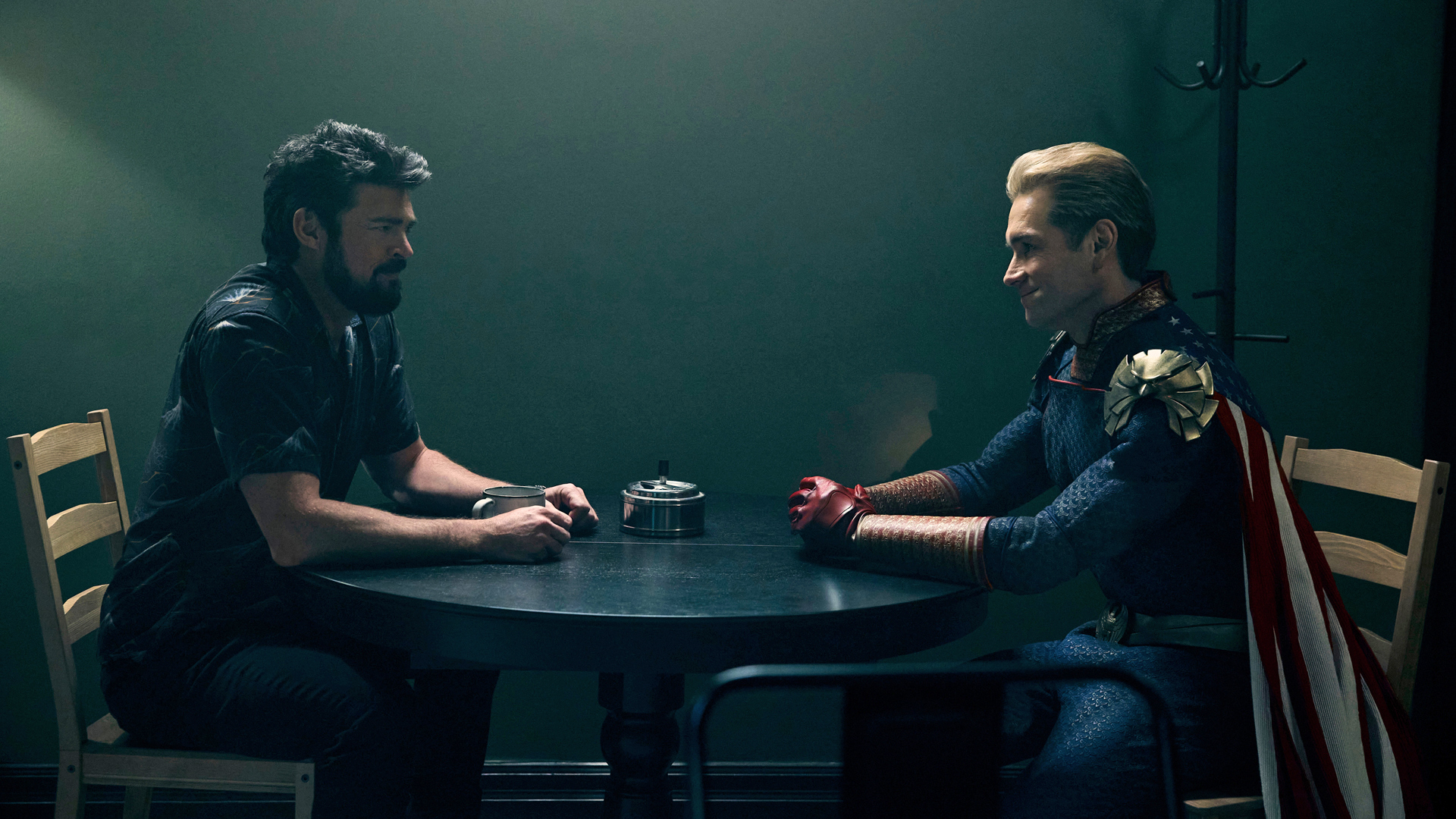
The Boys is more than a satirical superhero series. Yes, the hit Prime Video show is an R-rated project that parodies superheroes and the recent explosion of comic book-inspired movies. However, look deeper – there’s a joke about The Deep character here, we’re sure – and you’ll find a TV series that’s as thematically dense as the Garth Ennis and Darick Robertson’s graphic novel series it’s based on.
In The Boys season 3, the boundaries are pushed harder than ever before. The action is gorier, the jokes more mature, and tension ramped up. The show’s evolution is most notable, though, in its exploration of more complex and difficult subject matter than the Prime Video series’ previous seasons, particularly one that’s become more prevalent in the real world.
“The big, meta theme for this season is toxic masculinity,” showrunner Eric Kripke tells TechRadar. “I was always struck by that moment after [former US president] Donald Trump got Covid. His first move after recovering was to stand on the White House balcony and take off his mask. Why was it more important to him to present vitality over compassion? We’ve got this global Marlboro man, cowboy b******t myth, which started a very long time ago, that’s been poisoning generations of men. It’s one of the reasons we’re in a world where a lot of men are fronting for how empty and insecure they are inside.”
United we stand, divided we fall
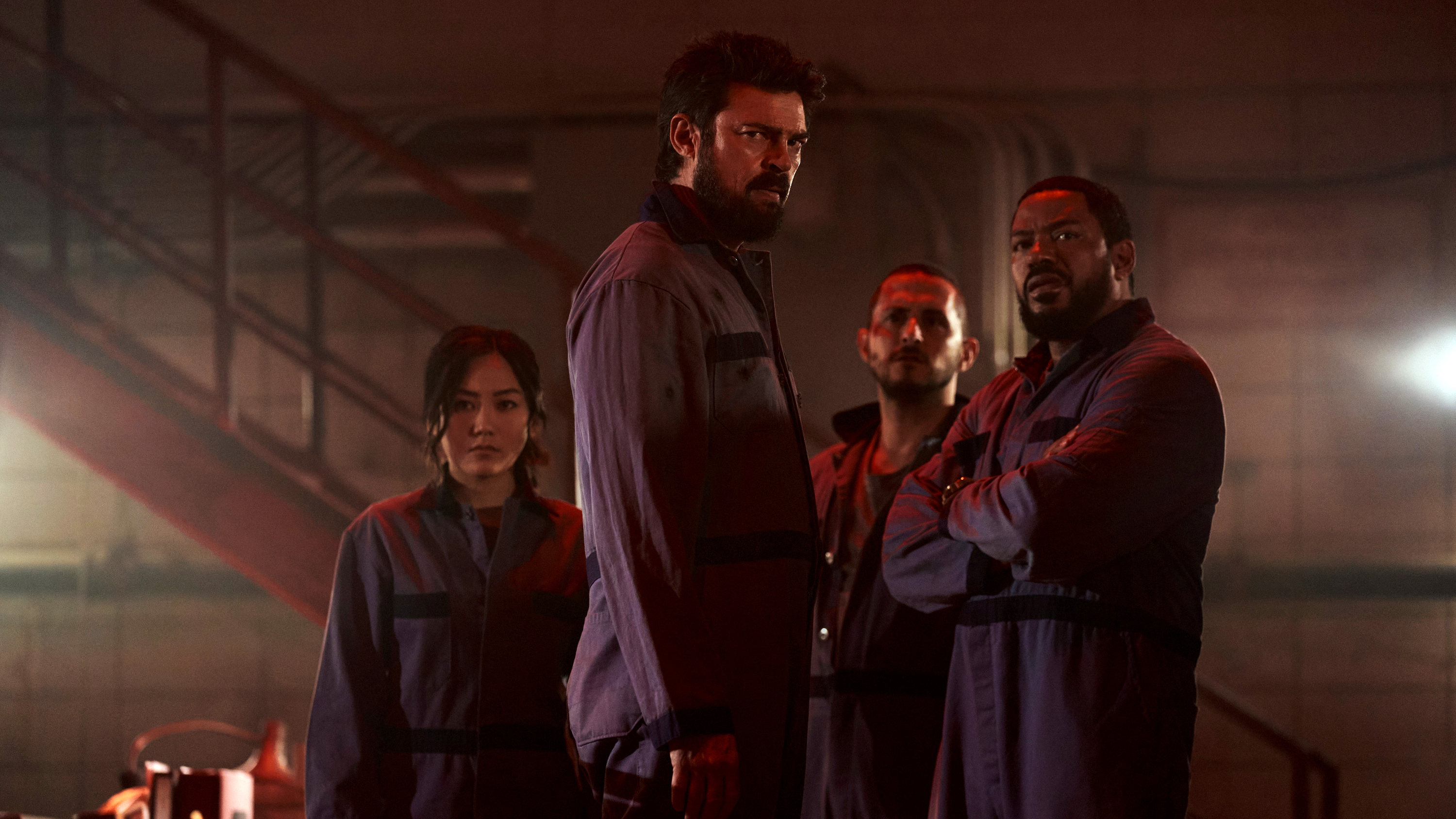
Set one year after the season 2 finale, The Boys season 3 opens in a relative time of peace. Hugh ‘Hughie’ Campbell (Jack Quaid) is working for the Federal Bureau of Superhuman Affairs (FBSA), a new government agency set up by congresswoman and secret Supe Victoria Neuman (Claudia Doumit), and reveling in his blossoming relationship with Starlight (Erin Moriarty).
Besides Hughie and Starlight, Frenchie (Tomer Capon) and Kimiko (Karen Fukuhara) are the only other ones benefiting from the tranquillity. Billy Butcher (Karl Urban), now working in tandem with the FBSA, feels reined in by the newly-formed organization and struggles to get over his ex-wife’s death. Homelander (Antony Starr) is becoming increasingly unhinged over declining public sentiment following his ill-fated relationship with right-wing superhero Stormfront (Aya Cash) and constraints placed on him by Vought International, the company that creates Supes.
With tensions simmering below the surface, it’s only a matter of time before everything erupts. So when The Boys learn of an anti-Supe weapon that supposedly killed Soldier Boy (Jensen Ackles), Vought’s first-ever Supe, they’re put on a collision course with The Seven, Soldier Boy’s former superteam Payback, and each other over how to handle this explosive revelation. Increasingly incendiary disagreements flare up within each team and it isn’t long before the groups are battling each other and themselves.
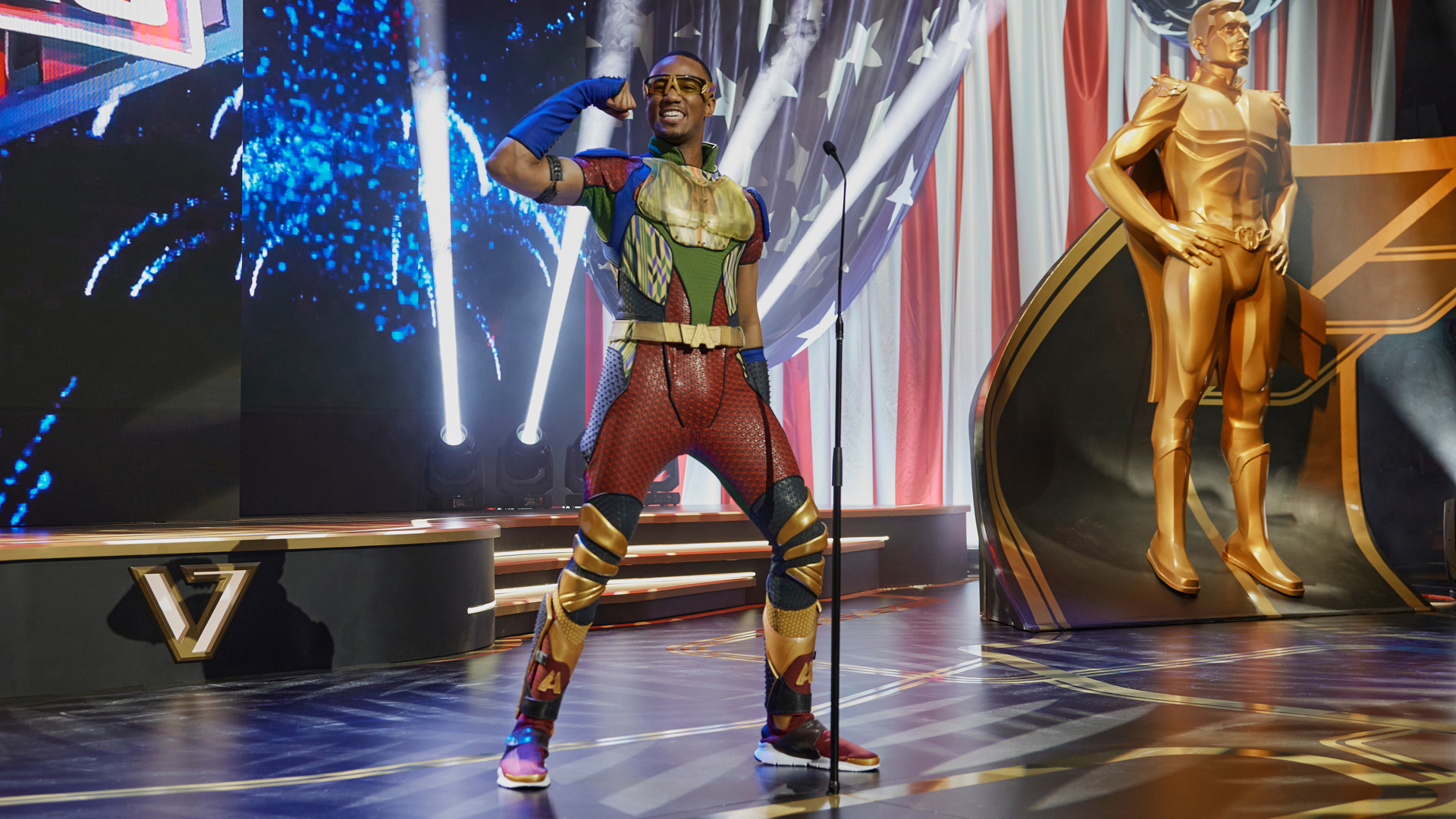
These internal divisions presented the show’s main cast with new and fascinating content to chew over. Arguments were common between The Boys and The Seven’s members in previous seasons, but such feuds were always resolved before it came to tackling their adversaries. However, as new factors and individuals upset the dynamics within each group, previously small-scale cracks in relationships develop into full-blown fissures. This leads to total estrangement between individuals and Marvel-style civil wars breaking out in each camp.
Get daily insight, inspiration and deals in your inbox
Sign up for breaking news, reviews, opinion, top tech deals, and more.
“This is the first time we see The Boys splitting as a group,” Capon explains. “Each member is on their own path and, when they meet again, something’s changed. This season is about exploring whether The Boys is a big, happy family. It’s always been The Boys versus The Seven, but now it’s everyone for themselves. You’re constantly questioning who’s doing the right thing.”
We’ve got this global myth... that’s been poisoning generations of men
Eric Kripke, The Boys showrunner
The result of these shifting dynamics is increasing desperation on the part of certain characters. As the season 3 trailers reveal, Butcher’s torment and slowly diminishing morality leads The Boys’ de facto leader to take Temp V, an experimental serum that gives its user superpowers for 24 hours – a decision that threatens to destroy The Boys’ tight-knit nature. However, it’s the unusual and uneasy alliances between characters, born out of the fracturing dynamics in each team, that really show how grave the situation becomes for The Boys (and members of The Seven) as the season progresses.
“There are moral implications and repercussions for the choices Butcher makes,” Urban explains. “Eventually, other characters have to make similar choices. There are thresholds that some won’t cross but others will, which leads to interesting new alliances and fracturing relationships, and the whole world changes as a result.”
Taking aim at toxic traits
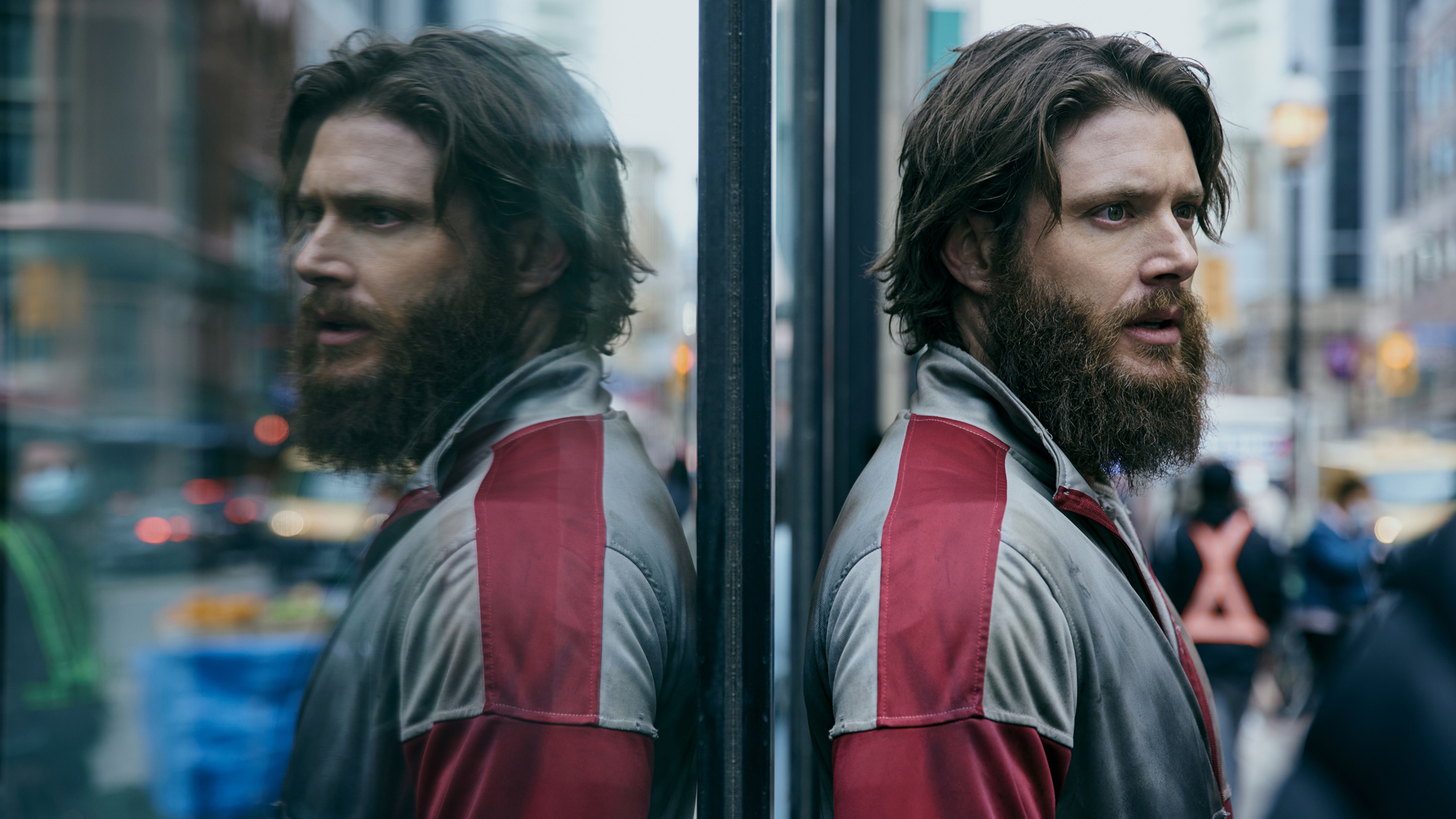
The arrival of Ackles’ Soldier Boy has been eagerly anticipated ever since the former Supernatural star was cast as the charming but merciless superhero. Kripke has regularly suggested Soldier Boy is far more unpleasant than Homelander, so this parodical take on Captain America only adds to the show’s largely depraved cast of characters. Introducing another apex predator alongside Butcher and Homelander is also sure to raise the stakes – not just for the show’s morally gray characters but, as Urban alluded to earlier, the entire world.
“Butcher and Homelander have been on a collision course since day one, and bringing another alpha male into the mix only makes things messier,” Ackles teases. “Just when you think one of them is on top, all of a sudden someone else pops up, or the third one moves ahead in the race for total control. It’s a great dynamic and one that makes for really entertaining television.”
“It’s interesting to see how that power dynamic shakes out,” Urban adds. “Who you think the apex predator is, and who it turns out to be, is fascinating to watch. The palpable frustration for each character is their inability to fight in the way they want to, but they set events in motion that change the whole world.”
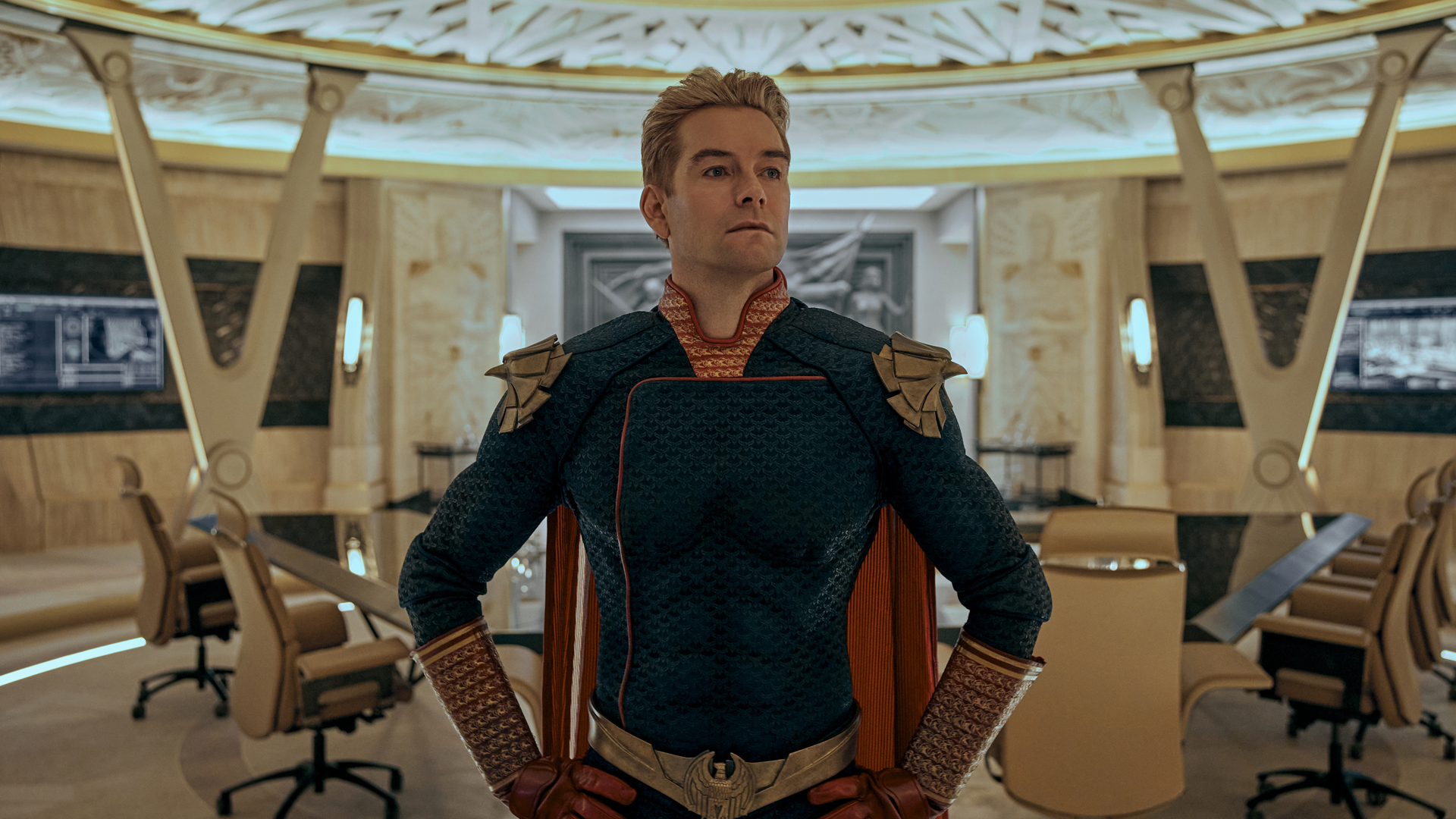
With three emotionally damaged and narcissistic alpha males – Butcher, Homelander, and Soldier Boy – leading their respective teams, it’s unsurprising that Kripke and company placed such an emphasis on tackling the topic of toxic masculinity. It’s a subject that not only permeates the entire season but is deeply entrenched in wider society and needs rooting out to make way for permanent gender equality.
For Ackles, who portrays a character who, in his own words, “would be canceled immediately” in today’s climate, addressing misogyny was vital to show how society has progressed, as well as what more needs to be done.
“It’s an interesting narrative on our current climate and culture,” Ackles muses. “Bringing in someone like Soldier Boy, who is essentially trapped in the past and doesn’t give a s**t, means he’s not going to assimilate by any means because that’s not who he is. I think we all know, or have heard of, someone like that. He’s from an era where people didn’t call him out and let him be as toxic as he wanted. Tapping into that wasn’t difficult as you see it in films or TV shows or in everyday life. We needed to put that front and center and show it’s not okay.”
By contrast, Butcher is well aware of his toxic personality. Urban, though, believes Butcher’s personal vendetta against Homelander stops him taking the necessary steps to end his crusade – and not even his “canaries in the coal mine” in Hughie or Mother’s Milk (Laz Alonso) can help him this time around.
“Butcher’s acutely aware of his toxic masculinity,” Urban says. “His safety valve is to put people around him to keep him in check; they keep him on the right line of morality. But this season those checks and boundaries aren’t enough to quench this lust he has to get revenge.”
The best way we can surprise viewers is by making them care about these characters
Eric Kripke, The Boys showrunner
And what of other members of The Seven? Granted, Homelander is the most toxic and dangerous of the group, but A-Train (Jessie T. Usher), The Deep (Chace Crawford), and Black Noir (Nathan Mitchell) also find themselves grappling with the relevancy of their manliness in season 3’s shifting landscape.
“A-Train’s totally lost,” Usher explains. “He doesn’t even see an abusive relationship as being abusive. He just wants fame and money; he’s terrified of going back to being insignificant. Being treated as a nobody is a lesser evil than actually being a nobody, so he’s willing to do whatever it takes to feel an artificial level of power.”
“The Deep is at a rock bottom place so the only way is up, right?” Crawford says. “This season tackles his loss of identity and the only thing he’s got is his fragile masculinity. He wants to have a purpose again. It becomes an unpredictable competition between these self-centered people that explores the gray area between human nature and corruption, and which side will win.”
“As much as he pushes for what he wants, he comes up against blocks,” Mitchell adds. “He’s a Supe but his ambition is limited. As we progress through this season, we see him take a stand for what he wants. For Noir, it’s less about power; it’s about him grappling with his desires versus the desires of other people and the fallout from that. You can say he has some dark soul of the night moments where he has to figure out who he’s going to be.”
Perfectly balanced, in every way
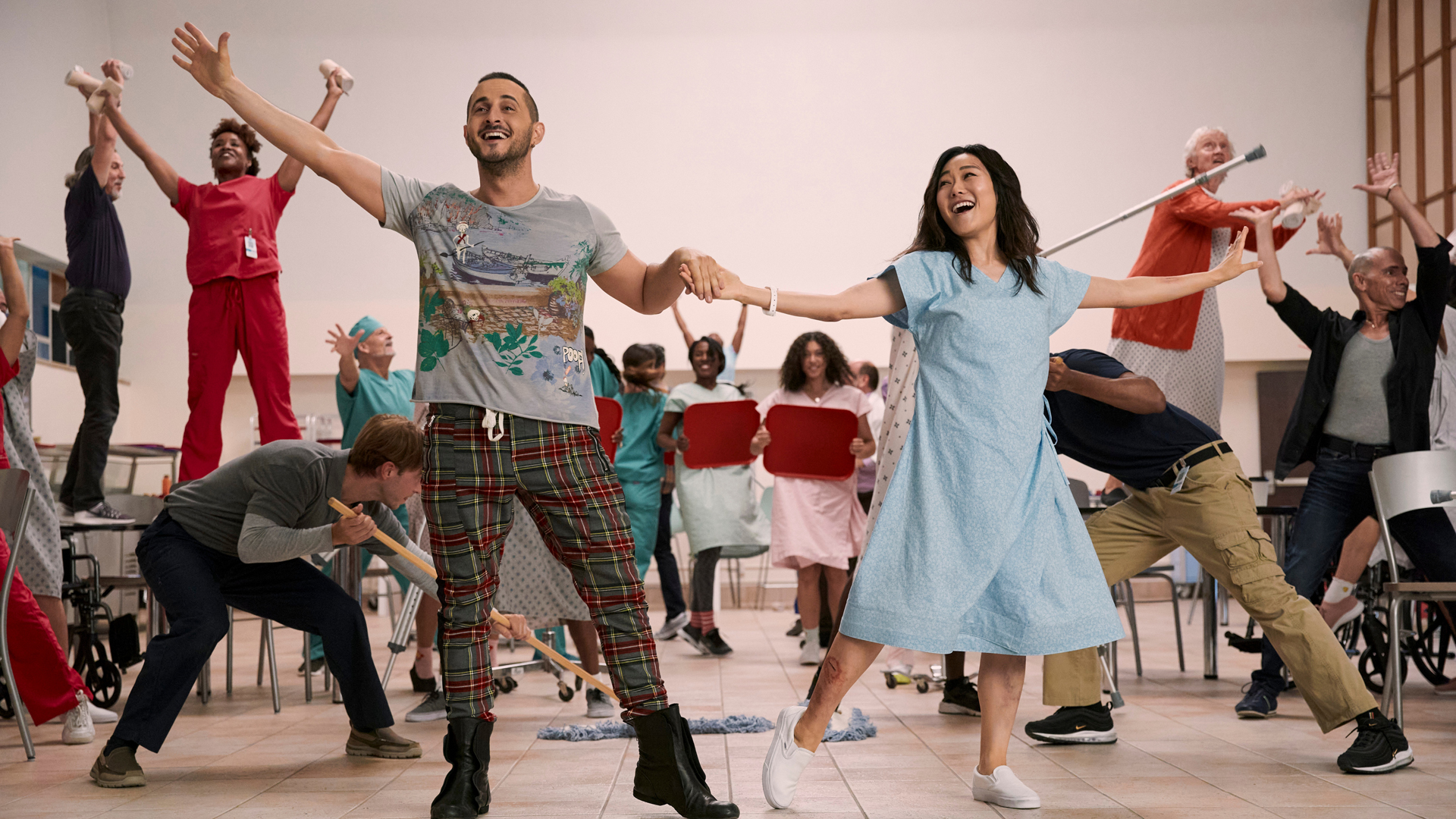
Despite the show’s examination of heavy subject matter, viewers don’t need to worry about its sardonic slant on superheroes being pushed into the background. Season 3 is as gratuitously violent and funny as its predecessors, with numerous scenes topping the infamous whale sequence from season 2 – and that’s before Herogasm, the comic series’ most controversial storyline, is even introduced in episode 6.
One such scenario is Kimiko and Frenchie’s musical number, which fans will recognize from season 3’s teaser trailers. It’s an amusing and wonderfully dreamlike sequence that only lasts 90 seconds, but is totally congruent with the surreal world of The Boys. Even so, it took Fukuhara and Capon some time to get used to the flamboyant, less gritty aesthetic on display compared to the style and color palettes that they ordinarily act in.
“There’s so much colorful detailing in everything [during that scene],” Fukuhara says. “Ironically there was no blood on set either, even though we were in a hospital. Kimiko usually wears black clothes, but our costume designer Michael Graham dressed me in this light blue hospital gown for that scene. It’s brighter and has a bit of flair about it. We added some extra fabric to let it flow like a dress – all those little details that you wouldn’t notice make it lighter and happier than what we’ve been used to.”
From combat sequences involving dildos to witty quips and amusing one-liners, The Boys season 3 is as stuffed with jaw-dropping and laugh-a-minute moments as the show’s first and second installments. With each passing season, though, the series finds a better balance between its outlandish humor, gruesome action, emotional story beats, and real-world issues.
Season 3’s study of toxic masculinity and the harmful cultural ‘norms’ born from it – bullying, domination, sexual assault, and chauvinism to name four – can be traced back to the series’ overall examination of power and consolidating it once someone gets a taste for controlling the narrative. Much like its source material, then, The Boys’ TV show is emblematic of the problems our global society faces. In shining a light on them – albeit through a caricature-style lens – its cast and creator hope to differentiate themselves from the Marvel movies and DC projects of the world.
“These characters are always reassessing where their cards lie,” Doumit says. “Their allegiances are constantly shifting, so there’s certainly a struggle where power is concerned. That concept of power, and how it fits into each one’s narrative, is the basis for the internal struggles within them all this season.”
“We definitely try to do the opposite of what other superhero projects,” Kripke adds. “We want to create a world as realistic as possible, but one that has superheroes in it. We’re not trying to be a parody; we’re trying to deconstruct the genre and show you what a s**t show it would be if you give people superpowers.
“We also try to be a uniquely character-driven show. Everyone knows they’re going to get ultraviolence and crazy scenes when they tune in. But the best way we can surprise viewers is by making them care about these characters, and that’s what we hope we’ve done.”
The Boys season 3 launches exclusively on Prime Video on Friday, June 3.
As TechRadar's senior entertainment reporter, Tom covers all of the latest movies, TV shows, and streaming service news that you need to know about. You'll regularly find him writing about the Marvel Cinematic Universe, Star Wars, Netflix, Prime Video, Disney Plus, and many other topics of interest.
An NCTJ-accredited journalist, Tom also writes reviews, analytical articles, opinion pieces, and interview-led features on the biggest franchises, actors, directors and other industry leaders. You may see his quotes pop up in the odd official Marvel Studios video, too, such as this Moon Knight TV spot.
Away from work, Tom can be found checking out the latest video games, immersing himself in his favorite sporting pastime of football, reading the many unread books on his shelf, staying fit at the gym, and petting every dog he comes across. Got a scoop, interesting story, or an intriguing angle on the latest news in entertainment? Feel free to drop him a line.